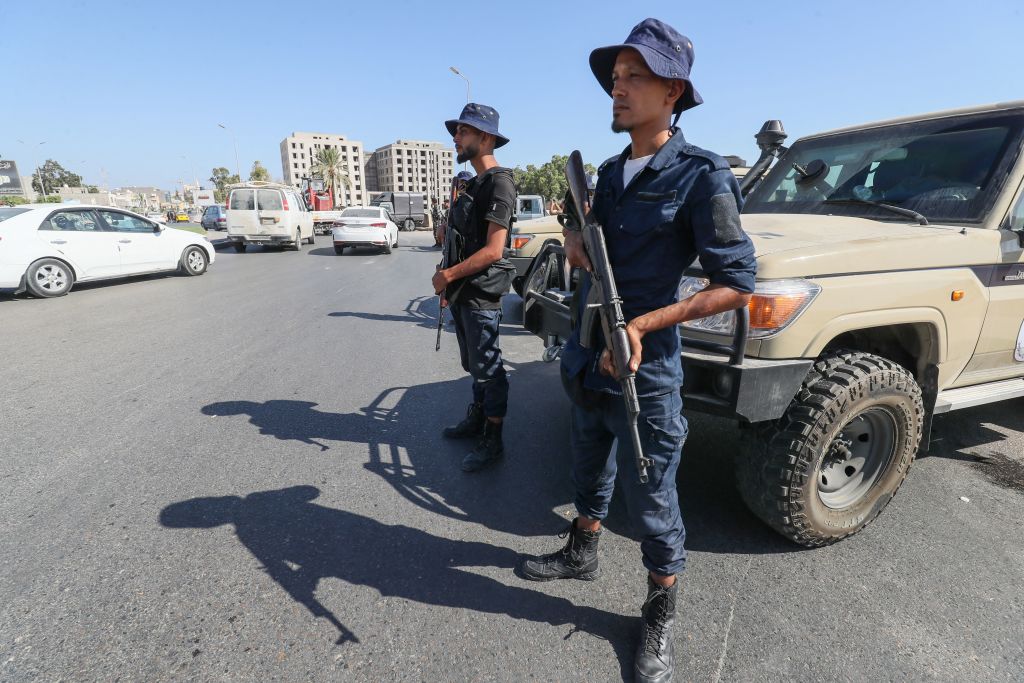ADF STAFF
Smoke billowed above Tripoli in mid-August as rival militias vying for power engaged in two days of fighting that killed at least 55 people and wounded about 160.
After months of relative calm in Tripoli, the violence erupted after Mahmoud Hamza, chief commander of the 444th Brigade, was captured at Mitiga Airport by gunmen with the Special Deterrence Force (SDF). SDF is the 444th Brigade’s chief rival and controls the airport. Both groups have vied for power since the overthrow of Moammar Gadhafi in 2011.
Libya expert Tahani Elmogrbi said competition between the 444th Brigade and SDF has escalated as SDF loses some of its influence.
“The 444 is more structured, military speaking, more organized, and it includes former soldiers from the [Gadhafi] regime,” Elmogrbi told Radio France Internationale (RFI). “Also their head, Colonel Mahmoud Hamza, is more influential.”
The 444th Brigade is affiliated with Libya’s defense ministry and controls Tripoli’s southern suburbs and other areas.
The SDF, commanded by Abdel Rauf Karah, acts as the capital’s police force and controls central and eastern Tripoli, including a prison and a civilian airport, the Mitiga Airport, which is used by civilians and the military.
Troops from both sides died in the August battle. In May, the groups clashed for hours in Tripoli, also after the arrest of a 444th Brigade member.
Hamza is a former commander of the SDF’s 20-20 Squad. In 2020, he left the SDF, took his squad, all vehicles and ammunition, and joined the Libyan Army, where he was tabbed as chief commander of the 444th Brigade. He was released to a neutral party two days after his capture by the SDF and officials declared a cease-fire.
The August violence forced flights to and from Mitiga Airport to be diverted, the cancellation of classes at the University of Tripoli and civilians to stay in their homes. The fighting involved the use of heavy weapons in residential areas, which outraged Human Rights Watch Libya researcher Hanan Salah.
“Surely, Libyans at risk of such violent incidents deserve more?” Salah told Al Jazeera. “Nothing will change unless there are consequences.”
The rival factions are considered the most powerful militias in Libya, and both are aligned with Prime Minister Abdulhamid al-Dbeibeh’s United Nations-backed Government of National Unity, based in Tripoli. But the groups have longstanding divisions that have sparked sporadic battles in Tripoli in recent years.
“For the past few months, Libya has known a sort of stable instability,” Rhiannon Smith, an expert from the Libya Analysis think tank, told RFI. “The political situation is still very uncertain. There are a lot of divisions and the armed groups are getting more and more powerful, but there haven’t been major clashes” until August.
The Government of National Unity’s struggle for power against the Sirte-based Government of National Stability further destabilizes the country. Longstanding issues between the parties have delayed elections since 2021.
Abdoulaye Bathily, the U.N.’s special envoy to Libya, told the U.N. Security Council in late August that political divisions in Libya “are fraught with risks of violence and disintegration for countries.”
“It is fundamental to restore Libya’s stability, to preserve regional security,” Bathily said in an Associated Press report. “Without an inclusive political agreement that paves the way for peaceful, inclusive and transparent elections across Libya, the situation will worsen and cause further suffering to the Libyan people.”
Bathily also warned that violence in Niger, which experienced a coup in July, and Sudan, where fighting between rival militaries has raged since April, could spill over into Libya.

